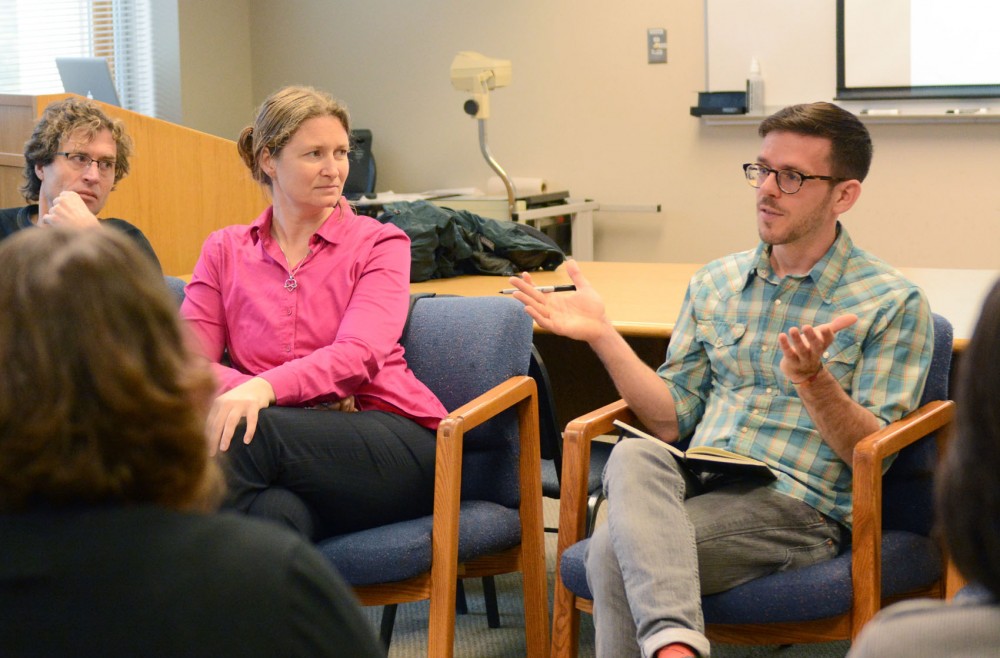In the sciences, personal lives are usually out of the equation, as most professions at the University of Minnesota and in industry focus on the quality of work and not the person behind it.
While many students, faculty and staff in science fields say the University is LGBT-friendly, moments of prejudice still surface.
In order to quantify the workforce climate for LGBTQ scientists, plant biology Ph.D. student Jeremy Yoder and education alumna Allison Mattheis distributed an online survey throughout the United States last spring.
Although the data showed most people felt comfortable being open about their identity with family and friends, in the workplace, scientists were split on whether they were “out” or not to their colleagues and students.
“I think that gets to something very basic about culture of science,” Yoder said, “which is that as scientists, we are taught … we’re supposed to remove ourselves from what we do as much as possible.”
Yoder presented the results of the survey at a College of Biological Sciences Bio-Diversity Brown Bag Series on Tuesday, where students, faculty and staff discussed the LGBT experience in the sciences at the University.
With the survey, Yoder said he hopes he can write recommendations for workplaces to be more accepting of diversity and quantify LGBTQ representation in science fields.
“For LGBTQ folks, we don’t even know if we’re underrepresented in sciences,” he said. “One of the basic motivations is to see who is out there.”
More than 1,300 scientists working in both industry and academia responded to the survey, which asked them questions about their sexual orientation, how open they are with their sexual identity and how accepting their work climates are.
Undergraduate LGBT students who are planning to go into academic scientific fields can generally expect acceptance, Yoder said.
Genetics, cell biology and development sophomore Brett Fredericksen said he expects his work will matter more to his colleagues than his identity as a gay man, so he doesn’t foresee any issues with possibly entering academia.
Psychology junior Emily Horton said academia is generally more accepting than other professions, so she feels comfortable pursuing a career at a university.
“Academia is a more progressive sphere … at least of gay people,” biology alumnus Thomas Giarla said, who identifies as gay. “I can’t really speak too much to other [identities], but especially at U of M, I never had any issues.”
While about a third of LGBTQ scientists said in the survey that they receive the same support and benefits as their straight colleagues, 27 percent said they receive limited or no support and benefits.
“I feel like it will definitely get a lot better,” psychology sophomore Sam Mendolia-White said. “Especially because I feel like the more educated people are, the more open they are about differences in general.”
Supporting each other
Associate chemistry professor R. Lee Penn was chatting with a coworker about their personal lives one day, when the coworker mentioned his wife.
But when Penn brought up her wife, the coworker claimed Penn “always” made it about her sexual identity.
Penn said she was able to correct his misconception. But if it was a superior, she said, she probably wouldn’t have felt comfortable reproaching them.
The downside of not sharing personal life at work, Yoder said, is that LGBT individuals may feel isolated.
“Just knowing there are other folks like you who are in your field can make a big difference to how it feels to be there,” he said.
Penn said she’s mentored individuals in the past and feels it’s important to provide that extra support. Survey participants agreed.
“I do think mentorship will set, or can help set, someone up for success,” Penn said, “And if that mentor is able to be supportive for a person who is out as a queer person, than that’s even better.”
Support from peers or a mentor is especially important, individualized studies junior Kyle Wohlman said, when LGBT individuals face hostility or disapproval.
“As with any community,” he said, “the more role models we have, the higher aspirations we have and the more confidence we can have in our LGBT identity.”
Yoder said the survey is only the first step toward understanding the challenges the LGBTQ community faces in the sciences. In the future, he hopes more studies will be done to quantify representation in science fields.
“Science careers have a long way to go before they reflect the full diversity of America,” he said.


